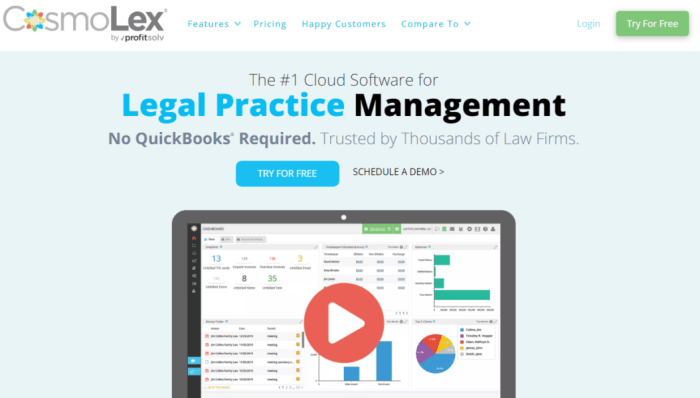In today’s competitive legal landscape, efficient client management is paramount. Law firm CRM software offers a powerful solution, streamlining operations and boosting profitability. This comprehensive guide delves into the intricacies of law firm CRM systems, exploring their features, benefits, and considerations for selection and implementation. We’ll also cover frequently asked questions and provide valuable resources to aid your decision-making process.
Understanding the Importance of CRM for Law Firms
A robust CRM (Customer Relationship Management) system is no longer a luxury but a necessity for modern law firms, regardless of size. It centralizes client information, automates tasks, and improves communication, leading to increased efficiency and client satisfaction. Key benefits include:
- Improved Client Communication: Centralized communication logs ensure no message is missed, fostering stronger client relationships.
- Enhanced Case Management: Track deadlines, manage documents, and collaborate effectively on cases, minimizing errors and delays.
- Increased Efficiency: Automate repetitive tasks like email marketing, appointment scheduling, and billing, freeing up valuable time for lawyers and staff.
- Better Client Retention: Personalized communication and proactive service enhance client loyalty and referrals.
- Improved Business Development: Identify new business opportunities, track marketing campaign effectiveness, and nurture leads more efficiently.
- Data-Driven Insights: Analyze key performance indicators (KPIs) to identify areas for improvement and optimize firm strategies.
Key Features of Law Firm CRM Software
Effective law firm CRM software incorporates a range of features tailored to the specific needs of legal practices. These features often include:
Client Management
- Contact Management: Store and manage detailed client information, including contact details, communication history, and case details.
- Matter Management: Track case progress, deadlines, and associated documents efficiently.
- Document Management: Securely store and access legal documents, ensuring easy retrieval and collaboration.
- Calendar and Scheduling: Schedule appointments, court appearances, and meetings, minimizing scheduling conflicts.
Communication and Collaboration
- Email Integration: Seamlessly integrate with email clients to track communications and manage correspondence.
- Task Management: Assign and track tasks, ensuring accountability and timely completion.
- Team Collaboration: Facilitate seamless collaboration among team members on cases and projects.
- Client Portal: Provide clients with secure access to case information and documents.
Reporting and Analytics
- Customizable Reporting: Generate reports on key metrics such as client acquisition costs, case win rates, and billable hours.
- KPI Tracking: Monitor key performance indicators to assess firm performance and identify areas for improvement.
- Data Analysis: Gain insights into client behavior and preferences to optimize marketing and business development strategies.
Billing and Time Tracking, Law firm crm software
- Time Tracking: Accurately track billable hours for accurate invoicing.
- Billing and Invoicing: Generate professional invoices and manage payments efficiently.
- Expense Tracking: Track expenses related to cases and projects for accurate financial reporting.
Choosing the Right Law Firm CRM Software
Selecting the right CRM software involves careful consideration of several factors:

Source: whsuites.com
- Firm Size and Structure: Choose a system that scales with your firm’s growth and accommodates your specific organizational structure.
- Budget: Consider both the initial cost and ongoing maintenance expenses.
- Features and Functionality: Prioritize features essential to your firm’s operations and workflow.
- Integration Capabilities: Ensure compatibility with existing software and applications, such as accounting software and email clients.
- User-Friendliness: Opt for a system with an intuitive interface that is easy for your team to learn and use.
- Security and Compliance: Prioritize systems that comply with relevant data privacy regulations and offer robust security features.
- Vendor Support: Choose a vendor that provides reliable technical support and training.
Top Law Firm CRM Software Options
The market offers a variety of CRM solutions tailored for law firms. Researching and comparing different options is crucial. Some popular choices include (Note: This is not an exhaustive list, and the best choice depends on individual needs): Clio, MyCase, PracticePanther, CosmoLex, and CaseFox.
Implementing and Integrating Law Firm CRM Software
Successful CRM implementation requires careful planning and execution. Key steps include:
- Data Migration: Carefully migrate existing client and case data into the new system.
- Training and Onboarding: Provide comprehensive training to your team on how to use the new software effectively.
- Customization: Configure the system to meet your firm’s specific needs and workflows.
- Integration with Existing Systems: Integrate the CRM with other software applications to streamline operations.
- Ongoing Monitoring and Optimization: Regularly monitor the system’s performance and make adjustments as needed.
Frequently Asked Questions (FAQ)
- Q: What is the cost of law firm CRM software? A: Costs vary significantly depending on the vendor, features, and number of users. Expect to pay a monthly or annual subscription fee.
- Q: How long does it take to implement a law firm CRM? A: Implementation time depends on the size of the firm, the complexity of the system, and the level of customization required. It can range from a few weeks to several months.
- Q: Is law firm CRM software secure? A: Reputable vendors prioritize data security and compliance with relevant regulations. Look for systems with robust security features, such as encryption and access controls.
- Q: Can I integrate my existing accounting software with a law firm CRM? A: Many CRM systems offer integration with popular accounting software packages. Check the vendor’s specifications to ensure compatibility.
- Q: What are the benefits of using a cloud-based CRM for my law firm? A: Cloud-based CRMs offer accessibility from anywhere, automatic updates, and scalability, making them a popular choice for many firms.
Resources
- Clio
- MyCase
- PracticePanther
- (Add other reputable sources here)
Conclusion
Investing in the right law firm CRM software is a strategic decision that can significantly enhance efficiency, improve client relationships, and boost profitability. By carefully considering your firm’s specific needs and selecting a system with the appropriate features and functionality, you can unlock the full potential of your practice and stay ahead in the competitive legal market.
Call to Action: Law Firm Crm Software
Ready to transform your law firm’s operations? Explore the options available and choose the CRM solution that best fits your needs. Contact us today for a free consultation and let us help you find the perfect fit!
Questions and Answers
What are the key features of law firm CRM software?

Source: webfx.com
Key features typically include contact management, case management, document storage, communication tools (email, calendar integration), reporting and analytics, and potentially legal-specific features like matter tracking and billing integration.
How much does law firm CRM software cost?
Pricing varies greatly depending on the features, number of users, and vendor. Options range from affordable cloud-based solutions to more expensive, enterprise-level systems with extensive customization.
How do I choose the right law firm CRM software for my firm?
Consider your firm’s size, specific needs, budget, and technical capabilities. Research different vendors, read reviews, and potentially request demos before making a decision.
What is the integration process like?
Integration processes vary depending on the software and your existing systems. Some CRMs offer seamless integration with popular platforms, while others may require more extensive setup and customization.
What kind of training is required to use law firm CRM software?
Most vendors provide training resources, including tutorials, documentation, and sometimes even in-person or online training sessions. The complexity of training depends on the software’s features and your team’s technical proficiency.
